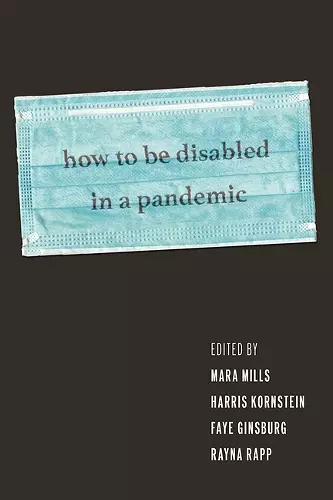How to Be Disabled in a Pandemic
Rayna Rapp editor Faye Ginsburg editor Mara Mills editor Harris Kornstein editor
Format:Paperback
Publisher:New York University Press
Published:25th Feb '25
Should be back in stock very soon
This paperback is available in another edition too:
- Hardback£77.00(9781479830831)

A chronicle of ableism and disability activism in New York City during the COVID-19 pandemic
How to Be Disabled in a Pandemic documents the pivotal experiences of disabled people living in an early epicenter of COVID-19: New York City. Among those hardest hit by the pandemic, disability communities across the five boroughs have been disproportionately impacted by city and national policies, work and housing conditions, stigma, racism, and violence—as much as by the virus itself. Disabled and chronically-ill activists have protested plans for medical rationing and refuted the eugenic logic of mainstream politicians and journalists who “reassure” audiences that only older people and those with disabilities continue to die from COVID-19. At the same time, as exemplified by the viral hashtag #DisabledPeopleToldYou, disability expertise has become widely recognized in practices such as accessible remote work and education, quarantine, and distributed networks of support and mutual aid. This edited volume charts the legacies of this “mass disabling event” for uncertain viral futures, exploring the dialectic between disproportionate risk and the creativity of a disability justice response.
How to Be Disabled in a Pandemic includes contributions by wide-ranging disability scholars, writers, and activists whose research and lived experiences chronicle the pandemic’s impacts in prisons, migrant detention centers, Chinatown senior centers, hospitals in Queens and the Bronx, subways, schools, housing shelters, social media, and other locations of public and private life. By focusing on New York City over the course of three years, the book reveals key themes of the pandemic, including hierarchies of disability "vulnerability," the deployment of disability as a tool of population management, and innovative crip pandemic cultural production. How to Be Disabled in a Pandemic honors those lost, as well as those who survived, by calling for just policies and caring infrastructures, not only in times of crisis but for the long haul.
An exciting, deep, and moving contribution to Disability Studies. How to be Disabled in a Pandemic is a model for real-time pandemic theorizing that includes the most affected—as subjects, interlocutors, collaborators, and authors. This eloquent record of the brutal first years of Covid is set in its early epicenter of New York City. The holdings and methods of this impressive anthology will inform the ways we continue to engage with the critical connections between Covid, illness, disability, and place in the future. * Alexandra Juhasz, Brooklyn College, CUNY *
So many forces want us to forget about the pandemic, to say that it’s over and not a concern anymore. How To Be Disabled in a Pandemic documents the wisdom of disabled oracles who resisted and challenged the system during the first three years of the pandemic in New York City. After reading this book, it’ll leave you wondering what could have happened if our ableist society centered disabled people and took them seriously. * Alice Wong, author of Year of the Tiger: An Activist’s Life *
Captures the history and textures of our present moment during the ongoing COVID-19 pandemic, using the best ethnographic tools to take us into New York City’s most impacted spaces and communities. In the process, How to be Disabled in a Pandemic opens up new paths of inquiry about chronic illness, institutional violence, accessibility, and mutual aid. A must-read for disability activists and scholars. * Aimi Hamraie, author of Building Access: Universal Design and the Politics of Disability *
Required reading for anyone who wants to understand the impact of COVID-19 in the United States. To be living with a disability in this country is to be a disposable person in the eyes of the state, even with the rights struggled for by generations of people living with disabilities. Over the past half-decade, New York City and the US implemented policies that made life more dangerous for disabled people, but disabled communities, of which there are many, figured out ways forward together to fight for their own survival—they will not be silent. * Gregg Gonsalves, Yale University *
This volume chronicles the experiences and activism of disabled people in New York City during the COVID-19 pandemic and includes contributions from scholars, writers and organizers. * Ms. Magazine *
ISBN: 9781479830855
Dimensions: unknown
Weight: 603g
392 pages